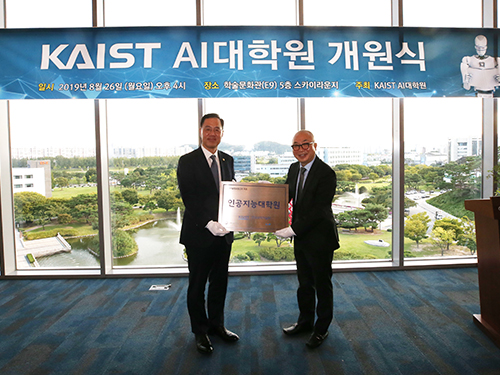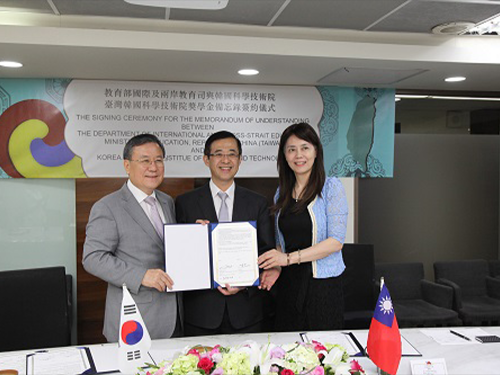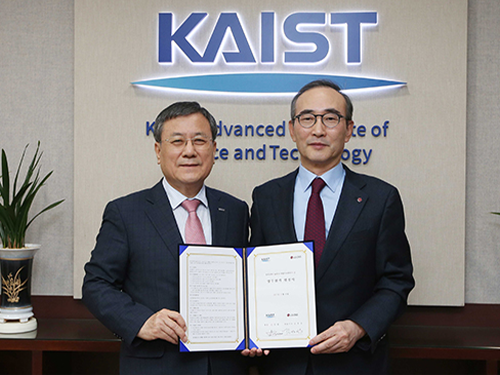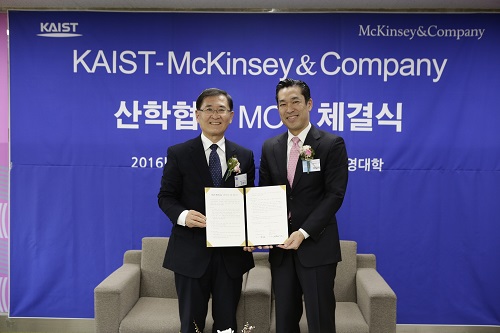MOU
-
 AI Graduate School to Take the Lead in Shaping the Future of AI
KAIST opened its AI Graduate School on August 26 with its first cohort of 22 Master’s and 10 PhD students for the 2019 fall semester. The new graduate school will provide students with a multidisciplinary curriculum incorporating the five key fields of healthcare, autonomous vehicles, manufacturing, security, and emerging technologies, and will offer 18 courses this semester.
KAIST was selected as one of the first three AI graduate schools that the Korean government will financially endorse to nurture top-tier AI specialists. The government will provide 9 billion KRW and KAIST will invest an additional 4.2 billion KRW in the school over the next five years.
KAIST aims to foster top-tiered AI engineers who will work for advancing emergent technologies for the Fourth Industrial Revolution. The school will produce original technologies by driving high-risk, innovative AI research projects and will be the main supplier of highly competent engineers who will lead the industry and advance the global market.
KAIST has a long history of AI research and has a top-level AI education and research infrastructure. In 1990, KAIST launched the first AI research center in Korea. Since then, KAIST has taken the lead in the field by making breakthroughs in intelligent sensing information systems and AI platforms. About 20 percent of the faculty members at KAIST, or about 120 professors, are conducting AI-related research while offering 136 AI-related courses.
The Dean of the AI Graduate School, Song Chong, said, “Our faculty members are the cream of the crop and are all in their early 40s. Although we started with only eight professors, we will employ 20 full-time professors by 2023 and will spare no effort to make the world’s best AI research hub and develop the brightest minds.”
Dean Chong said that three professors are already listed in the top ten when measured by the number of publications from the top two AI conferences, Neural Information Processing System (NIPS) and ICML (International Conference on Machine Learning). KAIST has several highly recognized faculty members who have published more than 10 NIPS/ICML papers over nine years, winning numerous awards including the ACM Sigmetrics Rising Star Award, Google AI Focused Research Award, and INFORMS Applied Probability Best Publication Award.
The number of students attempting to gain admission to the school is also very high. The admission office said that the percentage of applicants being offered admission stood at 9.1 percent. From next year, the school plans to increase the number of enrollments to 40 Master’s and 20 PhD students.
The school will also open the AI Graduate School Research Center in Songnam City next month and expand its collaboration with local companies in the Songnam and Pangyo region, both emerging techno and ICT valleys. With the placement of 60 research personnel in the center, the school plans to play a leading role in building the companies’ technical competitiveness.
The government’s keen interest was well highlighted with the attendance of many dignitaries including the Mayor of Daejeon City Tae-Jong Huh, Vice Minister of Science and ICT Won-Ki Min, and National Assemblyman Sang-Min Lee.
KAIST President Sung-Chul Shin stressed the importance of AI as a growth engine, saying, “AI will be a game changer and a key enabler of major industries. But the winner takes all in industry. Therefore, without producing the world’s top technology, we will not survive in the global market. To foster highly competitive specialists who will take the lead in this industry, we will educate students who can converge multiple disciplines and contribute to national growth and beyond in the years ahead.”
2019.08.27 View 7147
AI Graduate School to Take the Lead in Shaping the Future of AI
KAIST opened its AI Graduate School on August 26 with its first cohort of 22 Master’s and 10 PhD students for the 2019 fall semester. The new graduate school will provide students with a multidisciplinary curriculum incorporating the five key fields of healthcare, autonomous vehicles, manufacturing, security, and emerging technologies, and will offer 18 courses this semester.
KAIST was selected as one of the first three AI graduate schools that the Korean government will financially endorse to nurture top-tier AI specialists. The government will provide 9 billion KRW and KAIST will invest an additional 4.2 billion KRW in the school over the next five years.
KAIST aims to foster top-tiered AI engineers who will work for advancing emergent technologies for the Fourth Industrial Revolution. The school will produce original technologies by driving high-risk, innovative AI research projects and will be the main supplier of highly competent engineers who will lead the industry and advance the global market.
KAIST has a long history of AI research and has a top-level AI education and research infrastructure. In 1990, KAIST launched the first AI research center in Korea. Since then, KAIST has taken the lead in the field by making breakthroughs in intelligent sensing information systems and AI platforms. About 20 percent of the faculty members at KAIST, or about 120 professors, are conducting AI-related research while offering 136 AI-related courses.
The Dean of the AI Graduate School, Song Chong, said, “Our faculty members are the cream of the crop and are all in their early 40s. Although we started with only eight professors, we will employ 20 full-time professors by 2023 and will spare no effort to make the world’s best AI research hub and develop the brightest minds.”
Dean Chong said that three professors are already listed in the top ten when measured by the number of publications from the top two AI conferences, Neural Information Processing System (NIPS) and ICML (International Conference on Machine Learning). KAIST has several highly recognized faculty members who have published more than 10 NIPS/ICML papers over nine years, winning numerous awards including the ACM Sigmetrics Rising Star Award, Google AI Focused Research Award, and INFORMS Applied Probability Best Publication Award.
The number of students attempting to gain admission to the school is also very high. The admission office said that the percentage of applicants being offered admission stood at 9.1 percent. From next year, the school plans to increase the number of enrollments to 40 Master’s and 20 PhD students.
The school will also open the AI Graduate School Research Center in Songnam City next month and expand its collaboration with local companies in the Songnam and Pangyo region, both emerging techno and ICT valleys. With the placement of 60 research personnel in the center, the school plans to play a leading role in building the companies’ technical competitiveness.
The government’s keen interest was well highlighted with the attendance of many dignitaries including the Mayor of Daejeon City Tae-Jong Huh, Vice Minister of Science and ICT Won-Ki Min, and National Assemblyman Sang-Min Lee.
KAIST President Sung-Chul Shin stressed the importance of AI as a growth engine, saying, “AI will be a game changer and a key enabler of major industries. But the winner takes all in industry. Therefore, without producing the world’s top technology, we will not survive in the global market. To foster highly competitive specialists who will take the lead in this industry, we will educate students who can converge multiple disciplines and contribute to national growth and beyond in the years ahead.”
2019.08.27 View 7147 -
 KAIST Partners with Taiwan for PhD Scholarship Program
(President Shin, Taiwanese Acting Minister of Education Yao, Deputy Director General Chang at the Ministry of Education pose after signing the MOU.(from left))
President Sung-Chul Shin signed an MOU with the Ministry of Education in Taiwan for the Taiwanese PhD scholarship program. The signing was made between President Shin and Dr. Yao Leehter, acting Minister of Education in Taiwan, on June 27.
The Taiwanese Ministry of Education is signing MOUs with prestigious universities around the world to encourage its students to pursue study abroad opportunities at top schools. According to the MOU, Taiwanese PhD candidates will be able to use KAIST scholarships for their tuition fees, while the Taiwanese government will provide a stipend and living costs for four years from next September.
KAIST became the 14th university to sign this MOU, joining a group of top universities that includes University of Cambridge, Oxford University, California Institute of Technology, and Columbia University in the US. KAIST is the first institution in Asia to sign the MOU.
Acting Minister Yao said, “KAIST has emerged as a world leading university in less than five decades since its foundation. This remarkable growth led us to partner with KAIST. We hope this will serve as an opportunity to further our partnership in research collaboration as well as students exchanges.”
President Shin appreciated the Taiwanese government’s recognition of KAIST’s global reputation. He said, “We will closely collaborate with the Taiwan government and its universities for transforming educational opportunities to better respond to the Fourth Industrial Revolution.
2018.06.27 View 6491
KAIST Partners with Taiwan for PhD Scholarship Program
(President Shin, Taiwanese Acting Minister of Education Yao, Deputy Director General Chang at the Ministry of Education pose after signing the MOU.(from left))
President Sung-Chul Shin signed an MOU with the Ministry of Education in Taiwan for the Taiwanese PhD scholarship program. The signing was made between President Shin and Dr. Yao Leehter, acting Minister of Education in Taiwan, on June 27.
The Taiwanese Ministry of Education is signing MOUs with prestigious universities around the world to encourage its students to pursue study abroad opportunities at top schools. According to the MOU, Taiwanese PhD candidates will be able to use KAIST scholarships for their tuition fees, while the Taiwanese government will provide a stipend and living costs for four years from next September.
KAIST became the 14th university to sign this MOU, joining a group of top universities that includes University of Cambridge, Oxford University, California Institute of Technology, and Columbia University in the US. KAIST is the first institution in Asia to sign the MOU.
Acting Minister Yao said, “KAIST has emerged as a world leading university in less than five decades since its foundation. This remarkable growth led us to partner with KAIST. We hope this will serve as an opportunity to further our partnership in research collaboration as well as students exchanges.”
President Shin appreciated the Taiwanese government’s recognition of KAIST’s global reputation. He said, “We will closely collaborate with the Taiwan government and its universities for transforming educational opportunities to better respond to the Fourth Industrial Revolution.
2018.06.27 View 6491 -
 Strengthening Industry-Academia Cooperation with LG CNS
On November 20, KAIST signed an MoU with LG CNS for industry-academia partnership in education, research, and business in the fields of AI and Big Data. Rather than simply developing education programs or supporting industry-academia scholarships, both organizations agreed to carry out a joint research project on AI and Big Data that can be applied to practical business.
KAIST will collaborate with LG CNS in the fields of smart factories, customer analysis, and supply chain management analysis.
Not only will LG CNS offer internships to KAIST students, but it also will support professors and students who propose innovative startup ideas for AI and Big Data. Offering an industry-academia scholarship for graduate students is also being discussed. Together with LG CNS, KAIST will put its efforts into propose projects regarding AI and Big Data in the public sector.
Furthermore, KAIST and LG CNS will jointly explore and carry out industry-academia projects that could be practically used in business. Both will carry out the project vigorously through strong cooperation; for instance, LG CNS employees can be assigned to KAIST, if necessary. Also, LG CNS’s AI and Big Data platform, called DAP (Data Analytics & AI Platform) will be used as a data analysis tool during the project and the joint outcomes will be installed in DAP.
KAIST professors with expertise in AI deep learning have trained LG CNS employees since the Department of Industrial & Systems Engineering established ‘KAIST AI Academy’ in LG CNS last August.
“With KAIST, the best research-centered university in Korea, we will continue to lead in developing the field of AI and Big Data and provide innovative services that create value by connecting them to customer business,” Yong Shub Kim, the CEO of LG CNS, highlighted.
2017.11.22 View 13165
Strengthening Industry-Academia Cooperation with LG CNS
On November 20, KAIST signed an MoU with LG CNS for industry-academia partnership in education, research, and business in the fields of AI and Big Data. Rather than simply developing education programs or supporting industry-academia scholarships, both organizations agreed to carry out a joint research project on AI and Big Data that can be applied to practical business.
KAIST will collaborate with LG CNS in the fields of smart factories, customer analysis, and supply chain management analysis.
Not only will LG CNS offer internships to KAIST students, but it also will support professors and students who propose innovative startup ideas for AI and Big Data. Offering an industry-academia scholarship for graduate students is also being discussed. Together with LG CNS, KAIST will put its efforts into propose projects regarding AI and Big Data in the public sector.
Furthermore, KAIST and LG CNS will jointly explore and carry out industry-academia projects that could be practically used in business. Both will carry out the project vigorously through strong cooperation; for instance, LG CNS employees can be assigned to KAIST, if necessary. Also, LG CNS’s AI and Big Data platform, called DAP (Data Analytics & AI Platform) will be used as a data analysis tool during the project and the joint outcomes will be installed in DAP.
KAIST professors with expertise in AI deep learning have trained LG CNS employees since the Department of Industrial & Systems Engineering established ‘KAIST AI Academy’ in LG CNS last August.
“With KAIST, the best research-centered university in Korea, we will continue to lead in developing the field of AI and Big Data and provide innovative services that create value by connecting them to customer business,” Yong Shub Kim, the CEO of LG CNS, highlighted.
2017.11.22 View 13165 -
 KAIST and McKinsey Korea Agreed to Cultivate Management Leaders
KAIST and McKinsey Korea signed a memorandum of understanding (MOU) for the “Joint Research on Innovative Instructional Method to Cultivate Future Management Leaders” on April 8, 2016, at the SUPEX Management Hall of KAIST Management School in Seoul.
Under the MOU, both organizations will cooperate in the following research areas: management strategies to overcome the low growth of Korean economy, instructional methods to foster leaders in the field of business and management, and innovative management systems for business.
President Kang said, “We are pleased to work with McKinsey, a worldwide management consulting firm, to foster leaders in science and business. As we see more demanding challenges of managing and leading science-based businesses today, this alliance is indeed timely and will be very helpful.”
2016.04.15 View 6434
KAIST and McKinsey Korea Agreed to Cultivate Management Leaders
KAIST and McKinsey Korea signed a memorandum of understanding (MOU) for the “Joint Research on Innovative Instructional Method to Cultivate Future Management Leaders” on April 8, 2016, at the SUPEX Management Hall of KAIST Management School in Seoul.
Under the MOU, both organizations will cooperate in the following research areas: management strategies to overcome the low growth of Korean economy, instructional methods to foster leaders in the field of business and management, and innovative management systems for business.
President Kang said, “We are pleased to work with McKinsey, a worldwide management consulting firm, to foster leaders in science and business. As we see more demanding challenges of managing and leading science-based businesses today, this alliance is indeed timely and will be very helpful.”
2016.04.15 View 6434 -
 KAIST and the University of Minnesota-Twin Cities Partner for Research and Education Collaboration
President Steve Kang of KAIST and President Eric W. Kaler of the University of Minnesota-Twin Cities (United States) signed a memorandum of understanding to create exchange programs for students and faculty and to conduct joint research in the field of health and food. The following is an excerpt from President Kaler’s blog (https://storify.com/UMNstory/globalumn-hksk#edaadf) on his visit of KAIST on November 18, 2015:
A visit to the Korea Advanced Institute of Science and Technology
About 90 miles from Seoul—and more than that two-and-a-half-hours of a bus ride through the rugged early-morning traffic of South Korea’s capital city—sits Daejeon, Korea’s sixth largest city and home to KAIST, the Korea Advanced Institute of Science and Technology. Today, President Kaler and the small University of Minnesota delegation accompanying him visited what’s considered Korea’s MIT, a place focused on research and known to push the limits toward the future.
Fingernail heart monitors? Wireless anesthetic-monitoring devices?
KAIST is working on them.
The overlap of interests—from biomedical engineering to nanotechnology to robotics—between KAIST (pronounced “Kyst”) and the U are remarkable. Smartphone apps to monitor human health and GPS-driven robots to serve military interests or deliver packages were among the developing inventions that KAIST scientists showed to Kaler.
And even the personal relationships seem to illustrate the cliché of a small world and the natural affinity of Minnesota and KAIST.
KAIST’s President Sang Mo Kang was once the head of the University of Illinois’ department of electrical and computer engineering, and he and Kaler—a renowned chemical engineer before becoming the U’s president—hit it off … despite disagreeing about the potential outcome of Saturday’s Illinois-Gophers football game.
Accompanying Kaler on the day’s journey, meetings, and signing of a Memorandum of Understanding between the two schools to advance collaborations was U Associate Professor Sang Hyun Oh. Oh happens to be a physics graduate of this very KAIST and is now a rising star in Minnesota’s Department of Electrical and Computer Engineering.
The two sides agreed to focus on matching scholars on their respective campuses to discuss the sorts of research the two institutions can partner on. The idea of “Grand Challenges,” at the core of the U’s Twin Cities campus Strategic Plan, has fascinated Korean higher education leaders during Kaler’s weeklong visit, and KAIST’s leadership was interested in the health and food research, two U strengths.
###
2015.12.04 View 9615
KAIST and the University of Minnesota-Twin Cities Partner for Research and Education Collaboration
President Steve Kang of KAIST and President Eric W. Kaler of the University of Minnesota-Twin Cities (United States) signed a memorandum of understanding to create exchange programs for students and faculty and to conduct joint research in the field of health and food. The following is an excerpt from President Kaler’s blog (https://storify.com/UMNstory/globalumn-hksk#edaadf) on his visit of KAIST on November 18, 2015:
A visit to the Korea Advanced Institute of Science and Technology
About 90 miles from Seoul—and more than that two-and-a-half-hours of a bus ride through the rugged early-morning traffic of South Korea’s capital city—sits Daejeon, Korea’s sixth largest city and home to KAIST, the Korea Advanced Institute of Science and Technology. Today, President Kaler and the small University of Minnesota delegation accompanying him visited what’s considered Korea’s MIT, a place focused on research and known to push the limits toward the future.
Fingernail heart monitors? Wireless anesthetic-monitoring devices?
KAIST is working on them.
The overlap of interests—from biomedical engineering to nanotechnology to robotics—between KAIST (pronounced “Kyst”) and the U are remarkable. Smartphone apps to monitor human health and GPS-driven robots to serve military interests or deliver packages were among the developing inventions that KAIST scientists showed to Kaler.
And even the personal relationships seem to illustrate the cliché of a small world and the natural affinity of Minnesota and KAIST.
KAIST’s President Sang Mo Kang was once the head of the University of Illinois’ department of electrical and computer engineering, and he and Kaler—a renowned chemical engineer before becoming the U’s president—hit it off … despite disagreeing about the potential outcome of Saturday’s Illinois-Gophers football game.
Accompanying Kaler on the day’s journey, meetings, and signing of a Memorandum of Understanding between the two schools to advance collaborations was U Associate Professor Sang Hyun Oh. Oh happens to be a physics graduate of this very KAIST and is now a rising star in Minnesota’s Department of Electrical and Computer Engineering.
The two sides agreed to focus on matching scholars on their respective campuses to discuss the sorts of research the two institutions can partner on. The idea of “Grand Challenges,” at the core of the U’s Twin Cities campus Strategic Plan, has fascinated Korean higher education leaders during Kaler’s weeklong visit, and KAIST’s leadership was interested in the health and food research, two U strengths.
###
2015.12.04 View 9615